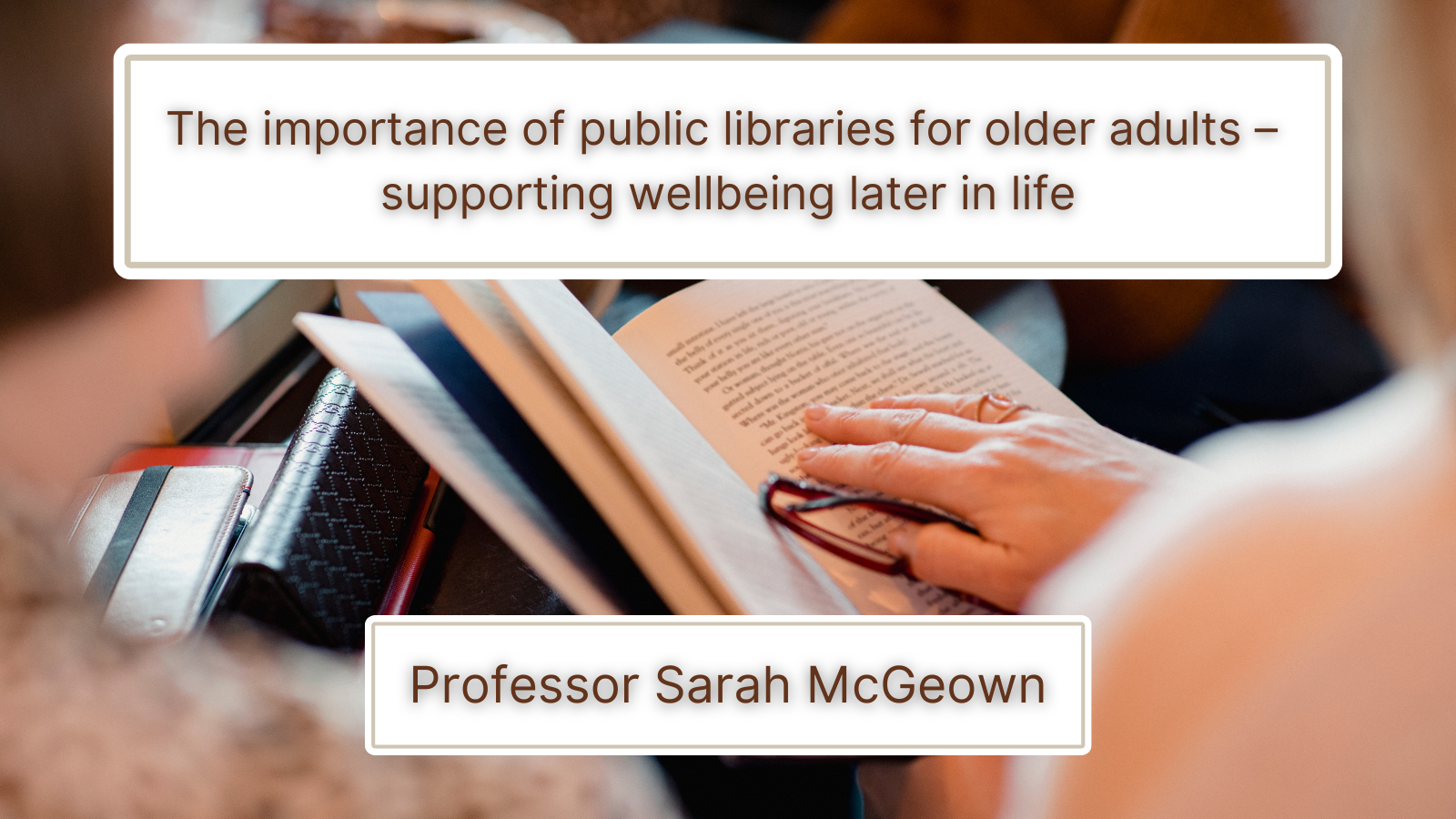The importance of public libraries for older adults: Supporting wellbeing later in life
Category: Blog

Professor Sarah McGeown, Professor of Literacy, and Director of the Literacy Lab, University of Edinburgh
As an intellectually and emotionally stimulating and enriching activity, research demonstrates that book reading during late adulthood has the potential to improve cognitive functioning (Hertzog et al., 2009; Stine-Morrow et al., 2015), protect against late-life cognitive decline (Hultsch et al., 1999), have a positive impact on health outcomes and daily life functioning (Bavishi et al., 2016; Bialownskla et al., 2023; Yamashita et al., 2018), and delay the manifestation of late-life pathology (Wilson et al., 2020). Indeed, reading has been described as a ‘whole-brain exercise’ (Stine-Morrow et al., 2015) with significant potential to support cognitive health during late adulthood.
In addition, research demonstrates that reading (or listening to) books supports older adults’ psychological wellbeing (Currie, Wilkinson & McGeown, forthcoming; Rothbauer & Dalmer, 2018), offering opportunities to pursue existing or identify new interests, engage with personally meaningful content, and develop their knowledge and understanding of the world, themselves and others (e.g., Eekhof et al., 2022). In addition, social reading practices (e.g., sharing and discussing books with others), can foster feelings of connection, belonging, and friendship (Lang & Brooks, 2015; Malyn et al., 2020; Rothbauer & Dalmer, 2018) among older adults.
Therefore, as a cognitively and emotionally enriching activity, books offer a vast array of choice for older adults to pursue their personal interests and preferences. Yet for these benefits of reading to be realised, older adults need to have access to quality books to support and enrich later life – highlighting the essential role of public libraries. In addition, public libraries offer warm, comfortable and safe spaces to host reading groups, and there is evidence to demonstrate that book groups or other literature-based activities also have considerable potential to support older adults’ wellbeing, through facilitating social interaction, integration and friendship (Lang & Brooks, 2015; Malyn et al., 2020; Rothbauer & Dalmer, 2018; Toepoel, 2013).
Selected references:
Bavishi, A., Slade, M. D., & Levy, B. R. (2016). A chapter a day: Association of book reading with longevity. Social Science and Medicine, 164, 44–48. https://doi.org/10.1016/j.socscimed.2016.07.014
Currie, N., Wilkinson, K., & McGeown, S. (forthcoming). Reading Fiction and Psychological Wellbeing During Older Adulthood: Positive Affect, Connection and Personal Growth. Reading Research Quarterly.
Eekhof, L. S., van Krieken, K., & Willems, R. M. (2022). Reading about minds: The social-cognitive potential of narratives. Psychological Bulletin & Review, 29, 1703–1718. https://doi.org/10.3758/s13423-022-02079-z
Hertzog, C., Kramer, A. F., Wilson, R. S., & Lindenberger, U. (2009). Enrichment effects on adult cognitive development: Can the functional capacity of older adults be preserved and enhanced? Psychological Science in the Public Interest, 9(1), 1–65. https://doi.org/10.1111/j.1539-6053.2009.01034.x
Hultsch, D. F., Hertzog, C., Small, B. J., & Dixon, R. A. (1999). Use it or lose it: Engaged lifestyle as a buffer of cognitive decline in aging? Psychology and Aging, 14(2), 245–263. https://doi.org/10.1037/0882-7974.14.2.245
Lang, C., & Brooks, R. (2015) The experience of older adults with sight loss participating in audio book groups. Journal of Occupational Science, 22(3), 277–290. https://doi.org/10.1080/14427591.2013.851763
Malyn, B. O., Thomas, Z., & Ramsey-Wade, C. E. (2020). Reading and writing for well-being: A qualitative exploration of the therapeutic experience of older adult participants in a bibliotherapy and creative writing group. Counselling and Psychotherapy Research, 20(4), 715–724. https://doi.org/10.1002/capr.12304
Rothbauer, R., & Dalmer, N. (2018). Reading as a lifeline among aging readers: Findings from a qualitative interview study with older adults. Library & Information Science Research, 40(3–4), 165–172, https://doi.org/10.1016/j.lisr.2018.08.001
Yamashita, T., Keene, J. R., Moonie, S. A., Shen, J. J., Pharr, J. R., & Yoo, J. W. (2018). Literacy activity and health among older adults in the USA. Educational Gerontology, 44(10), 627–638. https://doi.org/10.1080/03601277.2018.1521077